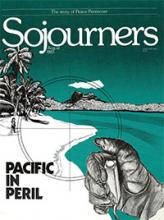In May, 1981, the Fourth Assembly of the Pacific Conference of Churches (PCC) met in Nuku'alofa, Tonga, and called upon the churches of the South Pacific to "continually review...and take appropriate actions in regard to nuclear issues and the interrelated issues of colonialism." The statement from Nuku'alofa was short and to the point:
We reaffirm our commitment to a nuclear-free Pacific. As Christian people committed to stewardship, justice, and peacemaking, we oppose and condemn the use of the Pacific for the testing, storage, and transportation of nuclear weapons and weapons delivery systems; the disposal of radioactive wastes; and the passage of nuclear-powered submarines and ships....
Further, as Christian people we are concerned about the colossal investment required for nuclear armaments and nuclear power, and urge the investment of our limited resources towards total human development, particularly for poor and rural communities, and for alternative safe and renewable sources of energy.
The people of the Pacific islands are aware of the nuclear powers' past, present, and proposed future use of their land, sea, and air, and they feel caught. One old woman in the village of Ngardmau, Palau, said, "In the second world war many of our people died. It was not our war. We do not wish to be at war with any people. And we do not wish to have anybody else's war fought on our land again."
Baiteke Nabetari, general secretary of the Pacific Conference of Churches, expressed similar feelings in a March, 1983 letter to French President Francois Mitterand referring to France's continued testing of nuclear warheads on Mururoa Atoll in Polynesia:
Read the Full Article

